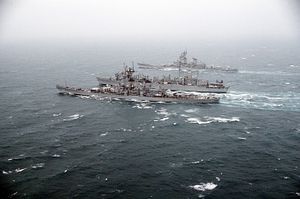If the United States wants to escape the danger zone in its strategic competition with China — disproving Beijing’s fancy that it can rule the Western Pacific — decommissioning the U.S. Navy’s fastest, most capacious combat logistics ships is no way to do it. Just the opposite. It telegraphs that America is no longer serious about fighting far from North America for long spans of time. Competitors will take note.
Yet budget-cutters in Washington are compelling naval leaders to consider narrowing this competitive advantage. And they’re doing so at a time when China finally appears to be putting its own combat logistics house in order after decades of neglect. Over at Defense News, Chris Cavas reports that U.S. Navy officials are considering decommissioning — or laying up, a halfway status between active service and the boneyard — the workhorse Supply-class T-AOEs.
T-AOEs are big, fast ships. In effect they’re mobile, floating warehouses that deliver fuel, ammunition, and stores of myriad types to task forces underway at sea. They displace about the same as a big-deck amphibious carrier such as USS America, a newcomer to the active fleet. And unlike their slower, smaller brethren, they can keep up with the speediest non-nuclear ships in the U.S. Navy fleet. The picture at the top depicts USS Sacramento, one of the Supply‘s forebears, rearming not one but two Iowa-class battleships at the same time, in the Persian Gulf in 1991. That gives you an idea of the size and capability of these vessels.
That’s an unglamorous capability, to be sure. But it’s a capability as irreplaceable as weapons and sensors for pummeling enemy fleets or enemy shores. Underway replenishment — UNREP, meaning the capacity to refuel, rearm, and reprovision at sea without detouring into port — has constituted a core U.S. Navy advantage since the days when seamen bearing names like Halsey and Spruance plied the deep. It makes the fleet a free-range fleet. Task forces thus equipped can roam the seas without putting into port for supplies. Mahan noted, in his pre-UNREP age, that warships without forward bases are like “land birds,” unable to fly far from home. So it is for seagoing forces without their own logistics contingents.
UNREP is handy in peacetime. It’s indispensable in wartime, when no friendly port may be nearby. Without supply ships, a task force has to quit its station to find stores. Abandoning contested waters surrenders command of those waters, or leaves soldiers or marines stranded on hostile shores without naval fire or air support. This is a bad thing all around. Before he met his maker, General Tōjō credited U.S. Navy UNREP as one of three decisive factors in Imperial Japan’s downfall. High praise from a defeated foeman. Combat logistics, then, is an operational technique commanding strategic importance.
Think about logistics ships this way. Mahan depicts foreign commerce, merchant and naval shipping, and forward bases as the three struts on which sea power rests. UNREP vessels comprise part of two, not just one, of Mahan’s nautical pillars. They’re ships, obviously. But they’re also substitute bases. So if adding stores ships lets U.S. Navy task forces fight or patrol the sea continuously, subtracting them compromises two pillars of American sea power. The same might be said of destroyer and submarine tenders, floating workshops that can manufacture spare parts and fix all manner of engineering troubles without requiring a visit to a shore maintenance depot. The navy’s tender fleet is woefully thin as well, at two sub tenders.
Granted, the maneuvering over the Supply-class T-AOEs is part of the never-ending kabuki dance over the defense budget. It does appear, nevertheless, that a weird dynamic has taken over Beltway deliberations over the past few years. The administration and Congress constrict naval spending more and more obtusely even as the need for a fleet with surplus capability — a fleet capable of taking heavy losses in combat and fighting on anyway — grows inexorably. It’s almost as though our leaders are deliberately recreating Walter Lippmann’s pre-World War II era of “monstrous imprudence,” when Washington took on vast Pacific commitments yet skimped on the naval means to defend them.
We know how well that worked out. The “just-in-time” philosophy currently in vogue in industry seems to have seeped into military and congressional thinking. To keep costs low, that is, business potentates maintain no excess inventory, getting widgets out to users when they demand it. That works fine for commercial enterprises. No one tries to interdict commercial supply chains. But if a navy maintains just enough logistics capacity to get by during peacetime steaming, when the demand is relatively low, what happens in wartime, when demand for supplies spikes and stays spiked? Bad things, methinks.
And how about when a smart adversary targets the UNREP fleet? That’s what I would do if — heaven forbid — some rash individual gave me command of Chinese or Iranian anti-access forces. Skip the combatants. They’re difficult targets. Cripple or sink the combat logistics fleet and the carriers, cruisers, and destroyers shrivel on the vine, deprived of the fuel and stores they need to remain on station. They’ll go away, or maintain an intermittent presence at best. The anti-access defender gains time and options — or wins outright.
Better an excess than a shortfall of logistics ships, then. As Admiral Wylie points out, Congress makes strategic decisions through the budgeting process all the time. In this case, capping the means necessary to stage operations along the Asian rimlands could rule out little things like, oh, honoring the U.S. security treaty with Japan, keeping the Strait of Hormuz open, or upholding the rule of law on the high seas. A just-in-time fleet optimized for peacetime cruising is apt to be an oops fleet in wartime.

































